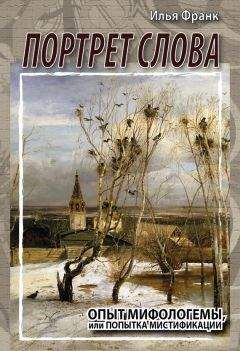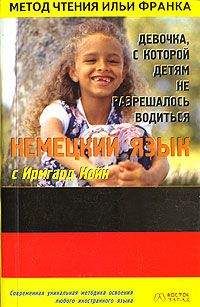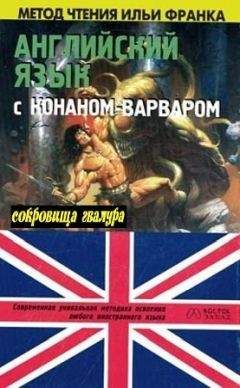Илья Франк - Английский язык c дружелюбным скелетом. Легенды североамериканских индейцев
Скачивание начинается... Если скачивание не началось автоматически, пожалуйста нажмите на эту ссылку.
Жалоба
Напишите нам, и мы в срочном порядке примем меры.
Описание книги "Английский язык c дружелюбным скелетом. Легенды североамериканских индейцев"
Описание и краткое содержание "Английский язык c дружелюбным скелетом. Легенды североамериканских индейцев" читать бесплатно онлайн.
The Friendly Skeleton (Доброжелательный Скелет)
An old man and his little nephew once lived in a dark woods (старик и его маленький племянник когда-то жили в темной дровосеке). One day the man went hunting (однажды старик: «мужчина» ушел охотиться = на охоту), and just before leaving (и как раз перед уходом) told the boy he must not go eastward (сказал мальчику, что тот не должен ходить на восток). But the boy became tired of playing in one place (но мальчик устал играть на одном месте), and was one day tempted to go in the forbidden direction (и однажды не удержался и пошел в запретном направлении; to tempt — соблазнять, искушать; прельщать, привлекать, притягивать; to forbid) until he came to a large lake (пока он не добрался до большого озера), where he stopped to play (где он /и/ остановился поиграть). While thus engaged (пока /он/ был так занят; to engage — привлекать, увлекать, занимать) a man came up to him and said (/какой-то/ мужчина подошел к нему и сказал), "Well, boy, where do you come from (эй, мальчик, откуда ты; to come from — быть родом из, происходить из)?"
nephew [`nevjH], eastward [`Jstwqd], forbidden [fq`bIdn], direction [dI`rekS(q)n, daI`rekS(q)n], engaged [In`geIGd]
An old man and his little nephew once lived in a dark woods. One day the man went hunting, and just before leaving told the boy he must not go eastward. But the boy became tired of playing in one place, and was one day tempted to go in the forbidden direction until he came to a large lake, where he stopped to play. While thus engaged a man came up to him and said, "Well, boy, where do you come from?"
The boy told him (мальчик рассказал ему) that he came from the woods (что он пришел из леса). Then the man said (тогда человек сказал), "Let us play together at shooting arrows (давай поиграем вместе в стрельбу из лука: «в стрельбу стрелами»)." So they shot off their arrows up into the air (итак, они выпустили свои стрелы вверх в воздух), and the boy's arrow went much the higher (и стрела мальчика ушла намного дальше). Then the man said, "Let us see (давай посмотрим) which can swim the farthest without breathing (который /из нас/ сможет проплыть дольше без дыхания = не дыша)," and again the boy beat the man (и снова мальчик победил мужчину; to beat — бить; побеждать). Then the latter said (тогда последний = мужчина сказал), "Let us go to the island (поедем на остров), where you will see many pretty birds (где ты увидишь много красивых птиц)." So they entered the canoe (и вот, они сели в каноэ: «зашли в каноэ»). Now, on either side of the canoe were three swans (а с каждой стороны каноэ было /по/ три лебедя) which propelled it (которые двигали его; to propel — толкать вперед, двигать; ускорять).
breathing [`bri:DIN], beat [bJt], island [`aIlqnd], canoe [kq`nH], swan [swOn], propel [prq`pel]
The boy told him that he came from the woods. Then the man said, "Let us play together at shooting arrows." So they shot off their arrows up into the air, and the boy's arrow went much the higher. Then the man said, "Let us see which can swim the farthest without breathing," and again the boy beat the man. Then the latter said, "Let us go to the island, where you will see many pretty birds." So they entered the canoe. Now, on either side of the canoe were three swans which propelled it.
As soon as they were seated in the canoe (как только они уселись в каноэ) the man began singing (мужчина начал петь), and very soon they arrived at the island (и очень скоро они приплыли на остров), around which they traveled for some time (вокруг которого они покатались некоторое время), and then the man took off all the boy's clothes (а затем мужчина снял всю одежду с мальчика), and, jumping into his canoe, said (и, запрыгнув в свое каноэ, сказал), "Come, swans, let us go home (пошли = вперед, лебеди, пойдем домой)," and he began to sing (и он начал петь). When the boy perceived (когда мальчик осознал; to perceive — воспринимать, понимать, осознавать) that he was deserted (что его бросили: «что он был оставлен/покинут») he went up the bank (он взобрался на берег) and sat down and cried (сел и заплакал), for he was naked and cold (ведь он был голый и замерз: «и холодный»).
arrive [q`raIv], jump [GAmp], perceive [pq`sJv], desert [dI`zq:t]
As soon as they were seated in the canoe the man began singing, and very soon they arrived at the island, around which they traveled for some time, and then the man took off all the boy's clothes, and, jumping into his canoe, said, "Come, swans, let us go home," and he began to sing. When the boy perceived that he was deserted he went up the bank and sat down and cried, for he was naked and cold.
It began to grow dark very fast (начало темнеть очень быстро; to grow dark — темнеть: «становиться темно»), and he was greatly frightened (и он был сильно напуган) when he heard a voice say (когда он услышал, /как/ /чей-то/ голос произнес), "Hist (тсс)! keep still (молчи: «держи тихо = оставайся тихим»)," and, looking around (и, оглянувшись), he saw a skeleton on the ground near him (он увидел скелет на земле возле него), which beckoned him and said (который поманил его и сказал; to beckon — манить, кивать; делать знак /рукой, пальцем/), "Poor boy (бедный мальчик), it was the same thing with me (та же самая вещь была и со мной = то же самое произошло и со мной), but I will help you (но я помогу тебе) if you will do something for me (если ты сделаешь кое-что для меня)." The boy readily consented (мальчик с готовностью согласился).
frighten [fraItn], skeleton [`skelItn], beckon [`bek(q)n], readily [`redIlI], consent [kqn`sent]
It began to grow dark very fast, and he was greatly frightened when he heard a voice say, "Hist! keep still," and, looking around, he saw a skeleton on the ground near him, which beckoned him and said, "Poor boy, it was the same thing with me, but I will help you if you will do something for me." The boy readily consented.
Then the skeleton told him to go to a tree near by (тогда скелет сказал ему пойти к дереву поблизости), and dig on the west side of it (и копать на западной стороне от него), and he would find a tobacco-pouch full of tobacco (и он найдет табачный мешочек, полный табака), a pipe (трубку), and a flint (и кремень); and the boy found them (и мальчик нашел их; to find) and brought them to the skeleton (и принес их скелету; to bring). It then said (он /скелет/ затем сказал), "Fill the pipe and light it (наполни трубку и зажги ее)"; and he did so (и он сделал так). "Put it in my mouth (вставь ее в мой рот)," said the skeleton (сказал скелет); and he did so (и он сделал так). Then, as the skeleton smoked (затем, пока скелет курил), the boy saw that its body was full of mice (мальчик увидел, что его тело было полно мышей), which went away because of the smoke (которые убежали из-за дыма).
pouch [pauC], tobacco [tq`bxkqu], body [`bOdI], mice [maIs]
Then the skeleton told him to go to a tree near by, and dig on the west side of it, and he would find a tobacco-pouch full of tobacco, a pipe, and a flint; and the boy found them and brought them to the skeleton. It then said, "Fill the pipe and light it"; and he did so. "Put it in my mouth," said the skeleton; and he did so. Then, as the skeleton smoked, the boy saw that its body was full of mice, which went away because of the smoke.
Then the skeleton felt better (тогда скелет почувствовал /себя/ лучше; to feel), and told the boy (и рассказал мальчику) that a man with three dogs (что человек с тремя собаками) was coming to the island that night to kill him (придет на остров той ночью убить его), and in order to escape (и, чтобы сбежать) he must run all over the island (он должен обежать весь остров) and jump into the water and out again many times (и прыгнуть в воду и из /нее/ много раз), so that the man would lose the trail (чтобы мужчина потерял след). Then, after tracking the island all over (затем, после /того, как он/ оставит следы по всему острову), he must get into a hollow tree near by (он должен забраться в пустое/дуплистое дерево поблизости), and stay all night (и остаться /там на/ всю ночь).
island [`aIlqnd], escape [Is`keIp], lose [lHz], hollow [`hOlqu]
Then the skeleton felt better, and told the boy that a man with three dogs was coming to the island that night to kill him, and in order to escape he must run all over the island and jump into the water and out again many times, so that the man would lose the trail. Then, after tracking the island all over, he must get into a hollow tree near by, and stay all night.
So the boy tracked the island all over (итак, мальчик наследил на всем острове) and jumped into the water many times (и прыгал в воду много раз), and at last went into the tree (и наконец забрался в дерево). In the early morning he heard a canoe come ashore (рано утром он услышал, /как/ каноэ подошло к берегу), and, looking out (и, выглянув), saw another man with three dogs (увидел другого мужчину с тремя собаками), to whom the man said (которым мужчина сказал), "My dogs, you must catch this animal (мои псы, вы должны поймать этого зверька)." Then they ran all over the island (затем они обежали весь остров), but not finding him (но не нашли его), the man became so angry (мужчина так разозлился) that he killed one of the dogs (что убил одного из псов) and ate him all up (и съел его всего; to eat smth. up). Then, taking the two remaining (затем, забрав двух оставшихся), he went away (он ушел прочь).
ashore [q`SL], animal [`xnIm(q)l], ate [et]
So the boy tracked the island all over and jumped into the water many times, and at last went into the tree. In the early morning he heard a canoe come ashore, and, looking out, saw another man with three dogs, to whom the man said, "My dogs, you must catch this animal." Then they ran all over the island, but not finding him, the man became so angry that he killed one of the dogs and ate him all up. Then, taking the two remaining, he went away.
The boy then came out from his hiding-place (мальчик вышел из своего убежища), and went to the skeleton, who said (и подошел к скелету, который сказал), "Are you still alive (ты все еще жив)?" The boy replied (мальчик ответил), "Yes (да)." "Well (хорошо)," said the skeleton, "the man who brought you here (человек, который привез тебя сюда; to bring) will come tonight to drink your blood (придет сегодня вечером выпить твою кровь), and you must go down to the shore (и ты должен пойти вниз на берег) where he will come in (где он будет приходить = сходить), and dig a long pit (и выкопать длинную яму) and lie down in it (и лечь в нее) and cover yourself up with the sand (и закрыть себя песком) so he cannot see you (чтобы он не смог увидеть тебя), and when he comes ashore and is off ( и когда он сойдет на берег и уйдет; to come ashore; to be off), you must get into the canoe and say (ты должен забраться в каноэ и сказать), 'Come, swans, let's go home (вперед, лебеди, пойдем домой),' and if the man calls for you to come back ( и если мужчина позовет тебя вернуться) you must not turn around or look at him (ты не должен оборачиваться или смотреть на него)."
reply [rI`plaI], around [q`raund]
The boy then came out from his hiding-place, and went to the skeleton, who said, "Are you still alive?" The boy replied, "Yes." "Well," said the skeleton, "the man who brought you here will come tonight to drink your blood, and you must go down to the shore where he will come in, and dig a long pit and lie down in it and cover yourself up with the sand so he cannot see you, and when he comes ashore and is off, you must get into the canoe and say, 'Come, swans, let's go home,' and if the man calls for you to come back you must not turn around or look at him."
The boy promised to obey (мальчик обещал послушаться) and soon the man who had brought him (и вскоре человек, который привез его; to bring) came ashore on the island (сошел на берег на острове). Then the boy jumped into the canoe (тогда мальчик запрыгнул в каноэ), saying, "Come, swans, let's go to our place (вперед, лебеди, поплыли домой: «в наше место»)"; and as they went (и когда они плыли) he sang just as the man had done (он пел так же, как делал мужчина). They had gone but a little way (они отплыли на небольшое расстояние) when the man saw them (когда мужчина увидел их). He began to cry (он начал кричать), "Come back (вернись; to come back)! Oh, do come back (о, вернись же)!" but the boy did not look around (но мальчик не оглянулся) and they kept on their way (и они продолжили свой путь; to keep on).
Подписывайтесь на наши страницы в социальных сетях.
Будьте в курсе последних книжных новинок, комментируйте, обсуждайте. Мы ждём Вас!
Похожие книги на "Английский язык c дружелюбным скелетом. Легенды североамериканских индейцев"
Книги похожие на "Английский язык c дружелюбным скелетом. Легенды североамериканских индейцев" читать онлайн или скачать бесплатно полные версии.
Мы рекомендуем Вам зарегистрироваться либо войти на сайт под своим именем.
Отзывы о "Илья Франк - Английский язык c дружелюбным скелетом. Легенды североамериканских индейцев"
Отзывы читателей о книге "Английский язык c дружелюбным скелетом. Легенды североамериканских индейцев", комментарии и мнения людей о произведении.









